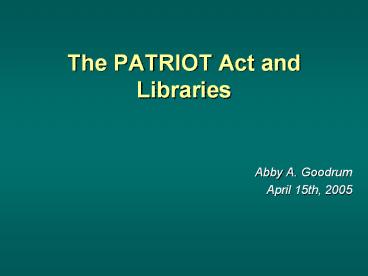The PATRIOT Act and Libraries
1 / 23
Title: The PATRIOT Act and Libraries
1
The PATRIOT Act and Libraries
- Abby A. Goodrum
- April 15th, 2005
2
As nightfall does not come at once, neither does
oppression. In both instances, there is a
twilight when everything remains seemingly
unchanged. And it is in such twilight that we
all must be most aware of change in the air,
however slight, lest we become unwitting victims
of the darkness. Supreme Court Justice
William O. Douglas.
3
USA PATRIOT Act
Uniting and Strengthening America by Providing
Appropriate Tools Required to Intercept and
Obstruct Terrorism Act of 2001
4
ALA Code of Ethics
- The American Library Association Code of Ethics
states the values to which we are committed, and
embodies the ethical responsibilities of the
profession in this changing information
environment. - III. We protect each library users right to
privacy and confidentiality with respect to
information sought or received and resources
consulted, borrowed, acquired or transmitted.
5
ALA Policy onConfidentiality of Library Records
- The Council of the American Library Association
strongly recommends that the responsible officers
of each library, cooperative system, and
consortium in the United States - 3. Resist the issuance of enforcement of any such
process, order, or subpoena until such time as a
proper showing of good cause has been made in a
court of competent jurisdiction.
6
Birth of the Patriot Act
- 342 pages long -- cobbled together hastily
- signed into law on 26 October 2001 in response to
terrorist attacks of 11 September 2001 - Not reviewed by most who voted for it
- Intended to alter provisions of the Foreign
Intelligence Surveillance Act (FISA) to reduce
restrictions on investigatory powers
7
Section 218 FISA Warrants
- Amends the Foreign Intelligence Security Act
(FISA) so that foreign intelligence or terrorism
need only be a significant purpose of the
investigation, rather than the purpose for FISA
court warrants.
8
Section 505National Security Letters
- Authorizes the use of National Security Letters
(NSL)(administrative subpoenas) for personal
records - Probable cause not required
- May be issued by FBI field offices
- Do not require ANY court oversight
9
Sections 214 216
- Extend telephone monitoring laws to e-mail, IP
addresses, and URLs - Authority provided by secret FISA court at
standards lower than probable cause - Gag order applies
10
Section 215
- Allows warrants for any tangible thing
including circulation records, computer hard
drives, floppy discs, ILL records, etc. - Authority provided by secret FISA court at
standards lower than probable cause - Lets agent seize an entire database when
investigating a single individual - Gag order
11
Provisions Subject to Sunset
- Section 224 calls for several sections to expire
on 31 December 2005 unless renewed by Congress
including - Section 218
- Section 214
- Section 215
12
DOJ Response
- The number of times section 215 has been used to
date is zero. - CNN.com, September 17, 2003
- CBSNews.com, September, 18, 2003.
13
Last weeks Senate Judiciary meeting.
- GONZALES Let me repeat what I said earlier.
- This department and the government has no
- interest in the library reading habits of
ordinary - Americans. We do believe, however, that
- libraries should not become safe havens for
- people who are here in this country and do want
- to do harm to other Americans.
- And we do have evidence of that happening, even
- though Section 215 has not been used in
- connection with library records. We do know that
- There have been examples of terrorists who are
- using access to computers at libraries.
14
ALA Study Background
- Prior Studies
- Smaller
- Limited to public or academic
- Questions and responses somewhat limited
- Importance of getting this type of data
15
Research Questions
- What impact, if any, have recent legislation and
law enforcement practices had on general access
to information, access to public information,
access to government information, library record
keeping, information security and filtering in
libraries, attitudes and behavioral intentions of
individuals in the user community, concerns for
civil liberties, and relations of libraries with
the law enforcement community?
16
Description of the Study
- Researchers from Syracuse, Waterloo and Florida
- Pilot project last year
- developed and pre-tested questions
- obtained feedback from DOJ and ALA legal
- 2 web-based surveys
- Notification by mail
- Unstructured interviews
- Sample size and selection
- 4,221 Academic libraries
- 1,536 Public libraries
17
Public Libraries
18
Academic Libraries
- There are approximately 3,200 institutions of
higher education, including community colleges,
four-year colleges, and universities. - 2004 NCES IPEDS file 4,200 entries
- The study surveys all 4,200 institutions
19
Concerns
- Individual responses to this survey will remain
completely confidential. The data will only be
discussed in aggregate form and no libraries that
participate in this survey will be identified.
The legal counsel of the American Library
Association has approved this survey, and the
questions DO NOT ask you for any information that
violates any government laws or regulations in
any way.
20
Concerns continued
- What if Ive had no law enforcement requests?
- What if I think the PATRIOT Act is a good thing?
21
Progress to Date
- Study has been running for 4 months
- Responses from approximately 1,000 public and
academic libraries so far. - Interviews began in February -- approximately 50
completed so far.. - We need your help!
22
Every Voice Counts!
- Abby Goodrum
- aagoodru_at_syr.edu
- agoodrum_at_watarts.uwaterloo.ca
23
(No Transcript)































